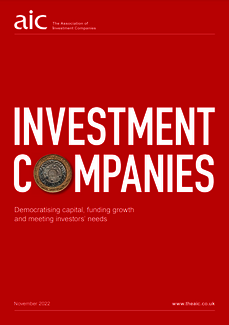For over 150 years investment companies have opened up a wealth of opportunity – allowing everyone from large institutions to private individuals to harness the potential of many different markets, sectors and industries.
Read more in our report: 'Investment companies: Democratising capital, funding growth and meeting investors’ needs'
Investment companies manage over £250bn of assets, a figure which has more than doubled over the last ten years.
Over £6bn of investment company assets are in venture capital trusts (VCTs), which invest in small, growing UK companies.
Mainstream equity funds make up a large portion of investment company assets. However, the percentage of assets in alternative investments, such as property, private equity and infrastructure, has been on the rise.
The average investment company discount reflects market sentiment and investor demand. At the end of October 2023 the average discount reached 17%, its widest level since the financial crisis, but has since recovered.
Investment companies offer strong long-term performance. Over the past ten years, the average company has returned approximately 9% a year. However, past performance must not be relied on as a guide to the future.
The average investment company yields around 4%, excluding investment companies with no yield.
New investment companies are created through initial public offerings (IPOs), but can raise further funds throughout their lives. Money raised by existing companies (called secondary fundraising) has exceeded IPO fundraising in recent years.
"The investment company sector is constantly changing to meet the needs of investors. That's why it has survived wars, recessions and market crashes for the last 150 years."
Annabel Brodie-Smith, Communications Director at the AIC
How do investment companies compare to other funds?
The table below allows you to compare the performance of investment companies in various AIC sectors to the performance of open-ended funds (OEICs and unit trusts) in the equivalent Investment Association (IA) sectors.
The red areas of the table show where investment companies have outperformed open-ended funds, and the blue areas show where open-ended funds have outperformed investment companies.
We update this table monthly to help investors understand how the performance of investment companies compares with open-ended funds over time.
Investment companies will not always perform better than other funds. However, they do have some advantages that can help their performance over time. For more information, see our Guide to investment companies.
Share price total returns on £100 to 31st March 2024
Source: AIC/Morningstar. All data to the end of March 2024. Sector averages are unweighted share price total return in pounds rebased to £100.
AIC publications
See industry statistics updated every month, or read our newsletter Compass. If you'd like to receive these updates by email every month, you can sign up using the form at the bottom of this page. Or contact us if you have a question.
Industry overview
A snapshot of investment company assets at each month end, together with a full list of all investment trusts and VCTs in our universe.
Corporate activity
A record of corporate actions by investment companies and VCTs, including fundraisings, IPOs, mergers, liquidations and policy changes.
Compass newsletter
Compass is the AIC's monthly newsletter for private investors, featuring views from investment trust managers and experts.
Notes & disclaimer
Please refer to our glossary for more detailed definitions of our data points.
- Source: AIC/Morningstar. Graph data will be updated for the previous month-end on the seventh working day of each month. Discount, performance and yield figures exclude VCTs.
- Discounts are weighted by market capitalisation of company and are based on cum-income, fair-value net asset values (known as cum fair NAVs).
- Share price performance figures are weighted by market capitalisation unless otherwise stated. NAV performance is based on, and weighted by, cum fair net assets.
- Average yields are weighted and include dividends paid from capital profits but exclude any special dividends.
- Fundraising information does not include issuance of shares from treasury.
- This data has been prepared by the AIC using Morningstar data and is for information purposes only. It is not an invitation or inducement to engage in investment activity nor does it purport to contain information on which to base investment decisions. Whilst the AIC and Morningstar have taken all reasonable steps to verify the statistics on our website, neither the AIC nor Morningstar accept responsibility for any errors or omissions in this publication or for any loss of any nature incurred by any person using this publication, howsoever caused. Past performance is not a guide to future performance and the performance of individual investment companies can diverge significantly from any average figures. Investors are advised to seek independent financial advice before making any investment decisions.




